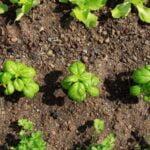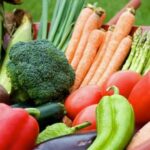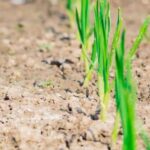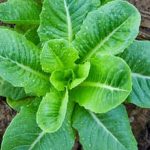Vegetable gardens can be a source of pride and satisfaction for many home gardeners, but achieving optimal growth and abundant harvests requires more than just planting seeds and providing water and sunlight. One crucial element for successful vegetable gardening is the use of fertilizers.
Fertilizers provide essential nutrients that are necessary for plant growth, development, and overall health. Without proper fertilization, vegetables may struggle to reach their full potential, leading to stunted growth, low yields, and increased susceptibility to pests and diseases.
Vegetable plants have specific nutrient needs throughout their lifecycle, from seedling to maturity. Understanding these needs is essential in selecting the right fertilizers to meet those requirements. Different elements such as nitrogen, phosphorus, potassium, calcium, magnesium, and others play vital roles in various aspects of plant growth. By providing the correct balance of these nutrients through fertilization practices, gardeners can support vigorous root development, leaf production, flowering, fruit set, and overall plant vitality.
In this article on fertilizers for vegetable gardens, we will explore the importance of fertilizers in achieving successful yields. We will delve into the specific nutrient requirements of different vegetable plants and discuss the various types of fertilizers available. Whether you prefer organic or synthetic options, we will guide you through the benefits and drawbacks of each.
Additionally, we will provide tips on how to select the right fertilizer for your unique vegetable garden conditions while minimizing environmental impact. By learning about proper application techniques and troubleshooting common fertilizer-related problems specific to vegetable gardens, you can enhance your gardening skills and maximize the effectiveness of your fertilizer regimen.
Stay tuned as we unravel the secrets behind successful vegetable garden fertilization.
Understanding the Nutrient Needs of Vegetable Plants
Vegetable plants have specific nutrient needs in order to grow and thrive. Understanding these essential elements is crucial for successfully fertilizing your vegetable garden. In this section, we will break down the main nutrients that vegetable plants require and explain their importance.
Macronutrients
Macronutrients are the primary nutrients that plants need in large quantities. They include nitrogen (N), phosphorus (P), and potassium (K).
- Nitrogen is important for leafy plant growth, as it is a key component of chlorophyll, which helps with photosynthesis. It is responsible for promoting lush foliage and green coloration in vegetables.
- Phosphorus plays a key role in root development, energy transfer within the plant, and fruiting. It aids in flower formation and seed production as well.
- Potassium contributes to overall plant health and disease resistance. It helps with water regulation, enzyme activity, photosynthesis, and fruit quality.
Micronutrients
Micronutrients are essential elements that are required by plants in smaller amounts compared to macronutrients. However, their role in plant growth should not be underestimated.
- Iron (Fe) is necessary for chlorophyll production and plays a crucial role in the transfer of energy within cells.
- Zinc (Zn) contributes to enzyme activity, protein synthesis, and DNA formation.
- Manganese (Mn) aids in photosynthesis by assisting with the breakdown of water molecules.
- Copper (Cu) is involved in various biochemical processes within the plant.
- Boron (B), molybdenum (Mo), chlorine (Cl), nickel (Ni), and cobalt (Co) are also important micronutrients that support various functions such as cell division, nutrient uptake, enzyme activation, and nitrogen fixation.
By understanding the specific nutrient needs of your vegetable plants, you can ensure that you choose the right fertilizer to meet those requirements. Testing your soil for nutrient deficiencies can also be helpful in determining which nutrients may need to be supplemented. Remember, providing your vegetable plants with the necessary nutrients will help them grow vigorously, produce abundant yields, and ward off diseases and pests.
Different Types of Fertilizers for Vegetable Gardens
Organic Fertilizers
Organic fertilizers are derived from natural sources and are an excellent choice for vegetable gardens that prioritize sustainability and environmental friendliness. These fertilizers contain organic matter such as compost, manure, and plant-based materials. One of the main benefits of organic fertilizers is that they improve soil structure by increasing its ability to retain moisture and nutrients. They also contribute to the growth of beneficial microorganisms in the soil, which promote overall plant health.
There are a variety of organic fertilizers available for vegetable gardens. Compost is one of the most popular choices, as it enriches the soil with essential nutrients and improves its overall fertility. Another common option is manure, which provides a good balance of nutrients and can be sourced from animals such as cows, chickens, or horses. Fish emulsion is another popular choice because it is high in nitrogen and can provide a quick boost to plants.
Synthetic Fertilizers
Synthetic fertilizers are manufactured using chemicals that provide specific nutrient ratios to plants. While they lack some of the benefits provided by organic fertilizers, they offer certain advantages that make them a viable option for vegetable gardens. Synthetic fertilizers are highly concentrated, allowing gardeners to provide precise amounts of nutrients to their plants. Additionally, synthetic fertilizers work quickly because they are readily available to plants once applied.
There are different types of synthetic fertilizers available on the market for vegetable gardens. The three numbers commonly found on fertilizer packaging represent the percentages of nitrogen (N), phosphorus (P), and potassium (K) in the product – often referred to as NPK ratio. For example, a fertilizer labeled as 10-10-10 contains 10% nitrogen, 10% phosphorus, and 10% potassium by weight.
Slow-release Fertilizers
Slow-release fertilizers are another type of fertilizer commonly used in vegetable gardens. These fertilizers contain nutrients that are released gradually over an extended period, ensuring a constant supply of essential elements to the plants. Slow-release fertilizers provide consistent nourishment and reduce the risk of over-fertilization or nutrient leaching.
There are two main types of slow-release fertilizers: organic-based and polymer-coated. Organic-based slow-release fertilizers consist of organic materials that take time to break down and release their nutrients into the soil. Polymer-coated slow-release fertilizers have a coating that controls the release rate of nutrients, allowing them to be slowly released over time.
It is important to note that slow-release fertilizers should be applied properly according to the manufacturer’s instructions to avoid burning plant roots or causing nutrient imbalances. However, they can be an excellent choice for gardeners who want a low-maintenance option that provides long-lasting nutrition for their vegetable plants.
Organic Fertilizers for Vegetable Gardens
Organic fertilizers are a popular choice among many vegetable gardeners due to their numerous benefits. Unlike synthetic fertilizers that are chemically formulated, organic fertilizers are made from natural sources such as animal or plant waste. This makes them more environmentally friendly and sustainable. Additionally, organic fertilizers provide several benefits to vegetable plants.
- Nutrient-rich: Organic fertilizers are packed with a wide range of essential nutrients that vegetables need for healthy growth. These nutrients include nitrogen, phosphorus, and potassium, as well as secondary nutrients like calcium and magnesium. Moreover, organic fertilizers also contain trace elements necessary for the overall health of vegetable plants.
- Microorganism support: Organic fertilizers promote the growth of beneficial microorganisms in the soil. These microorganisms help break down organic matter into simpler forms that plants can easily absorb. They also improve soil structure by creating air spaces and enhancing water retention capabilities.
- Slow-release action: One significant advantage of organic fertilizers is their slow-release nature. Unlike synthetic fertilizers that can cause nutrient leaching or rapid release, organic options release nutrients slowly over time. This ensures a steady supply of essential elements to the plants without risking nutrient imbalances or burnout.
When choosing an organic fertilizer for your vegetable garden, there are various options available:
- Compost: Compost is one of the most commonly used organic fertilizers in vegetable gardens due to its balanced nutrient content. It improves soil fertility, enhances water-holding capacity, and promotes beneficial microbial activity.
- Manure: Animal manure is another popular choice among gardeners as it is rich in nitrogen, phosphorus, and potassium. However, ensure that manure has been composted properly to eliminate any potential pathogens or weed seeds.
- Bone meal: Derived from animal bones, bone meal is an excellent source of phosphorus and calcium. It is especially beneficial for root and fruit development in vegetable plants.
- Fish emulsion: Made from fermented fish, fish emulsion is high in nitrogen and has trace minerals. It is an ideal organic fertilizer for leafy greens and fast-growing vegetables.
- Blood meal: Blood meal, made from dried animal blood, is a great source of nitrogen that promotes lush foliage growth in plants.
Organic fertilizers offer a natural and sustainable way to nourish your vegetable garden while providing numerous benefits for both the plants and the environment. By choosing the best organic option for your specific needs, you can ensure healthy and thriving vegetable plants throughout the growing season.
Synthetic Fertilizers for Vegetable Gardens
Synthetic fertilizers are a popular choice for many vegetable gardeners due to their convenience and effectiveness. However, there are pros and cons to using synthetic fertilizers that should be considered before making a decision on whether to incorporate them into your vegetable garden.
One of the main advantages of synthetic fertilizers is their high nutrient content. These fertilizers are typically formulated to provide plants with a balanced blend of essential nutrients, such as nitrogen, phosphorus, and potassium. This allows plants to quickly absorb the necessary nutrients for growth and development. Additionally, synthetic fertilizers often have controlled-release formulations, meaning that the nutrients are released slowly over time, providing a steady supply for the plants.
Another benefit of synthetic fertilizers is their convenience. Unlike organic fertilizers that may require composting or mixing before application, synthetic fertilizers can be easily purchased in pre-packaged forms from gardening stores. They are also readily available and accessible year-round. This makes them a convenient option for busy gardeners or those who prefer a hassle-free approach to fertilizing their vegetable gardens.
However, it is important to consider the potential drawbacks of using synthetic fertilizers as well. One disadvantage is that they can lead to nutrient imbalances in the soil if not used correctly. Synthetic fertilizers provide plants with specific nutrients in specific ratios, which can disrupt the natural nutrient balance in the soil over time unless proper care is taken.
Furthermore, unlike organic fertilizers that improve soil structure and fertility in the long term, synthetic fertilizers do not contribute to building healthy soils. They primarily focus on providing immediate nutrition to plants without addressing underlying soil health issues.
How to Choose the Right Fertilizer for Your Vegetable Garden
Choosing the right fertilizer for your vegetable garden is essential for ensuring healthy and productive plants. There are various factors to consider when making this decision, including the nutrient requirements of your specific vegetables, the type of fertilizer, and the overall health of your soil.
Firstly, it’s important to understand the nutrient needs of your vegetable plants. Different types of vegetables have varying nutrient requirements, so it’s crucial to choose a fertilizer that provides the necessary elements in the right proportions. The three main nutrients that all plants require are nitrogen (N), phosphorus (P), and potassium (K).
However, vegetables may also need other micronutrients such as calcium, magnesium, and iron. Conducting a soil test can help identify any deficiencies or imbalances in your soil, allowing you to choose a fertilizer that addresses these specific needs.
Another factor to consider is the type of fertilizer you want to use. There are two main categories: organic and synthetic fertilizers. Organic fertilizers include compost, animal manure, bone meal, and fish emulsion. They provide slow-release nutrients that improve soil structure and fertility over time. On the other hand, synthetic fertilizers are manufactured chemicals that provide nutrients in an easily soluble form. They offer quick results but may have environmental drawbacks if not used properly.
| Factor | Considerations |
|---|---|
| Nutrient Requirements | Different vegetables have varying nutrient needs. |
| Type of Fertilizer | Choose between organic or synthetic fertilizers based on your preferences and goals. |
| Soil Health | Evaluate the condition of your soil through a soil test to address any deficiencies or imbalances. |
Lastly, the overall health of your soil should be taken into consideration. If your soil is already rich in organic matter and nutrients, you may only need to use small amounts of fertilizer. On the other hand, if your soil is lacking in essential nutrients, you may need to apply larger amounts or choose a fertilizer with a higher concentration of those elements.
Proper Application Techniques for Fertilizing Vegetable Gardens
When it comes to fertilizing vegetable gardens, proper application techniques are essential for ensuring optimal plant growth and health. This section will provide you with a list of dos and don’ts to follow when applying fertilizer to your vegetable garden.
Dos:
- Follow the instructions on the fertilizer packaging: Different fertilizers have different application rates and methods. It is important to carefully read and follow the instructions provided by the manufacturer to ensure that you are applying the correct amount of fertilizer to your garden.
- Apply fertilizers at the right time: Timing is crucial when it comes to fertilizing vegetable gardens. It is generally recommended to apply fertilizer before planting or during active growth periods. This allows the plants to absorb the nutrients when they need them most.
- Use organic matter in addition to synthetic fertilizers: While synthetic fertilizers can provide plants with quick nutrients, it is also important to incorporate organic matter into your soil. Organic matter helps improve soil structure, moisture retention, and nutrient availability over time.
Don’ts:
- Over-fertilize: Applying too much fertilizer can harm your vegetable plants rather than help them. Excessive amounts of certain nutrients can lead to nutrient imbalances or even burn the roots of your plants. Always follow recommended application rates and avoid excessive use.
- Apply fertilizer too close to plant stems: When applying fertilizer, be mindful of where you place it in relation to the plant stems. Fertilizer applied directly onto plant stems can cause burns or other types of damage. Instead, spread the fertilizer around the drip line or a few inches away from the stems.
- Apply fertilizer in windy conditions: Windy conditions can cause fine particles of fertilizer to drift away from their intended target and land where they are not needed or wanted, such as on nearby water sources or non-target plants. To prevent this from happening, avoid applying fertilizer on windy days.
Following these dos and don’ts will help you apply fertilizer effectively and efficiently to your vegetable garden. By using proper application techniques, you can ensure that your plants receive the nutrients they need without causing any harm or negative impacts.
| Dos | Don’ts |
|---|---|
| Follow the instructions on the fertilizer packaging | Over-fertilize |
| Apply fertilizers at the right time | Apply fertilizer too close to plant stems |
| Use organic matter in addition to synthetic fertilizers | Apply fertilizer in windy conditions |
Troubleshooting Common Fertilizer-related Problems in Vegetable Gardens
When it comes to vegetable garden fertilization, issues can arise despite your best efforts. Understanding and troubleshooting common fertilizer-related problems is key to maintaining a healthy and productive vegetable garden.
One common issue that gardeners may encounter is nutrient deficiencies in their vegetables. This can manifest as yellowing leaves, stunted growth, or poor fruit production. Nutrient deficiencies often occur when there is an imbalance in the essential elements needed by the plants.
For example, a lack of nitrogen can cause pale leaves and weak stem growth, while a deficiency in potassium can result in poor root development and decreased fruit quality. To address these issues, it’s important to identify the specific nutrient lacking and choose a fertilizer that provides the necessary element.
Another common problem is overfertilization or nutrient burn. This occurs when too much fertilizer is applied, leading to excess levels of nutrients in the soil. Symptoms of overfertilization include brown or scorched leaf edges and wilting plants. Overfertilization can be detrimental to plant health as it can disrupt nutrient uptake and lead to imbalances in the soil composition. To prevent overfertilization, carefully follow package instructions for application rates and consider conducting a soil test before applying any fertilizers.
Additionally, inconsistent or incorrect application timing can also cause issues with fertilizer effectiveness. It’s important to apply fertilizers at the right time during the growing season according to the specific needs of your vegetables. Applying fertilizers too early or late may result in inadequate nutrient availability for your plants when they need them most. To avoid this problem, familiarize yourself with the growth stages of your vegetables and research their nutrient requirements.
By understanding and troubleshooting these common fertilizer-related problems in vegetable gardens, you will be better equipped to address any issues that arise and ensure the success of your garden. Monitoring your plants closely, practicing proper application techniques, and choosing the right fertilizer based on your plant’s needs will help maintain healthy vegetable growth and maximize your garden’s productivity.
Tips for Maximizing Fertilizer Effectiveness in Your Vegetable Garden
To ensure the most effective use of fertilizers in your vegetable garden, there are several tips and techniques you can implement. By following these guidelines, you can optimize nutrient uptake by your plants, promote healthy growth, and minimize any negative impacts on the environment.
- Soil Testing: Before applying any fertilizers to your vegetable garden, it is essential to conduct a soil test. This will help you understand the current nutrient levels in your soil and determine which specific nutrients may be lacking.
Soil testing kits are readily available at garden centers or through local agricultural extension services. Once you receive the results of your soil test, you can choose a fertilizer that is tailored to address your garden’s specific needs. - Timing: Proper timing is crucial for maximizing fertilizer effectiveness. In general, it’s best to apply fertilizers before planting or sowing seeds in your vegetable garden. This allows the nutrients to have time to break down and become available to the plants as they grow. Additionally, regular applications throughout the growing season can help maintain optimal nutrient levels for continuous plant health.
- Correct Application Rates: Applying fertilizers at the correct rates is essential for preventing over-fertilization or under-fertilization of your plants. Over-fertilizing can lead to nutrient runoff into water sources and damage to plants, while under-fertilizing may result in stunted growth or poor yields. Always follow the instructions on the fertilizer packaging carefully and measure accurately when applying.
- Proper Placement: It’s important to apply fertilizers directly where they are needed most – around the root zone of plants – rather than broadcasting them across the entire garden bed. This targeted approach ensures that nutrients are readily available for absorption by the plants’ roots.
- Watering Techniques: Adequate watering practices also play a role in maximizing fertilizer effectiveness. Before applying fertilizers, ensure that your vegetable garden is well-hydrated through irrigation or natural rainfall. After applying fertilizers, water your garden thoroughly to help the nutrients penetrate the soil and be absorbed by the plants.
By implementing these tips for maximizing fertilizer effectiveness in your vegetable garden, you can ensure that your plants receive the necessary nutrients for healthy growth and high yields. Remember to always follow the recommended guidelines for application rates and timing specific to the type of fertilizer you are using. With proper care, your vegetable garden can thrive and provide you with a bountiful harvest.
Conclusion
In conclusion, fertilizers play a crucial role in the success of vegetable gardens. Understanding the nutrient needs of your vegetable plants is essential, as it allows you to provide them with the necessary elements for healthy growth and abundant harvests. Whether you choose organic or synthetic fertilizers, each option has its own benefits and drawbacks.
When choosing a fertilizer for your vegetable garden, it is important to consider factors such as nutrient content, soil type, and plant requirements. Organic fertilizers, such as compost and manure, are a popular choice for many gardeners due to their natural ingredients and ability to improve soil health. On the other hand, synthetic fertilizers offer convenience and precise nutrient ratios but may have long-term environmental impacts if not used properly.
Proper application techniques are key to ensuring the effectiveness of fertilizers in your vegetable garden. Following dosing instructions and avoiding over – or under-fertilization can prevent nutrient deficiencies or toxicities that could harm your plants. Additionally, troubleshooting common fertilizer-related problems such as nutrient leaching or salt build-up can help maintain a healthy growing environment.
To maximize fertilizer effectiveness in your vegetable garden, consider implementing practices such as crop rotation, companion planting, and soil testing. These techniques can help ensure that your plants receive balanced nutrition throughout their growth cycle and minimize the risk of nutrient imbalances or deficiencies.
In summary, successful vegetable garden fertilization requires careful consideration of plant needs, proper selection of fertilizers based on those needs and other factors like soil type, correct application techniques, and regular monitoring for any issues or imbalances that may arise. By paying attention to these key takeaways and adapting them to your specific garden situation, you can enhance the health and productivity of your vegetable plants year after year.

If you’re looking to get into vegetable gardening, or are just looking for some tips on how to make your current garden better, then you’ve come to the right place! My name is Ethel and I have been gardening for years. In this blog, I’m going to share with you some of my best tips on how to create a successful vegetable garden.





